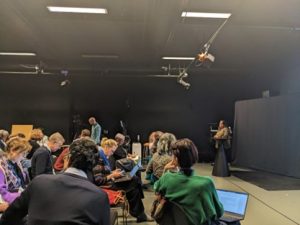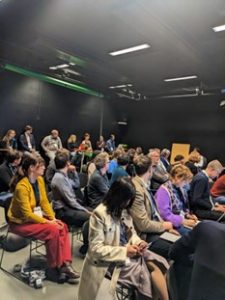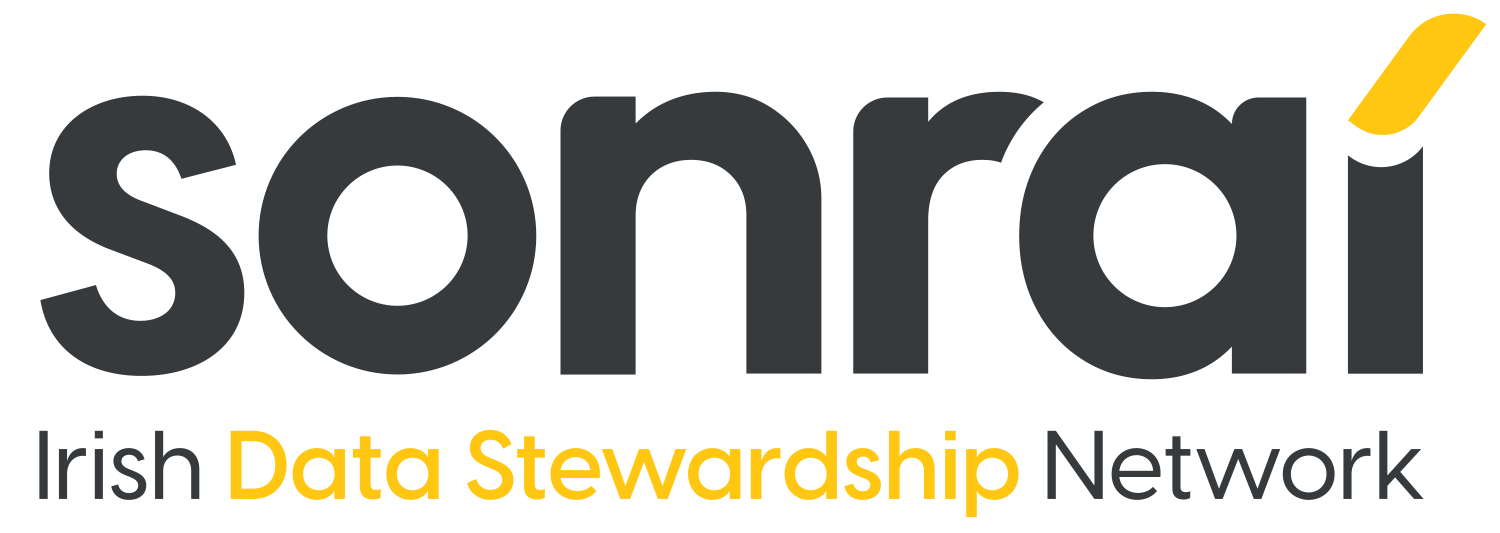A ‘Birds of a Feather’ session at the Research Data Alliance (RDA) 20th Plenary in Gothenburg, March 2023
This blog follows a recent ‘Birds of a Feather’ session at the Research Data Alliance (RDA) 20th Plenary on the topic of ‘Promoting synergies between national RDM and data stewardship networks’.
‘Promoting synergies between national RDM and data stewardship network’
The session in Gothenburg was proposed by Aoife Coffey and co-organised by Deborah Thorpe, both of the Research Data Service at University College Cork (UCC). Aoife is Research Data Coordinator at UCC and Lead Investigator on NORF Action 5, ‘National Data Stewardship Network’, which is establishing a national data stewardship network in Ireland. Deborah is Research Data Steward at UCC and as such hopes to be an active member of this network, which has now been given the name Sonraí. Partners on the network were involved in designing this session, which aimed to bring together national networks and groups supporting Research Data Management (RDM) and data stewardship to share experiences, identify common goals and challenges, and consider potential collaborations.
The session was designed to have a focus on informal discussion, involving both in-person and online attendees, and topics under consideration included ‘links to be forged between existing and emerging networks’; ‘how to sustain network and network activities long term’; and ‘the potential for shared projects and resources’.
About the RDA Plenary ‘Birds of a Feather’ sessions

First, a note on the concept of the ‘Birds of a Feather’ (BoF) session. The Research Data Alliance tackles data-related challenges through a structure of Working Groups, Interest Groups and Communities of Practice. Many of the sessions at the RDA Plenary are organised by these groups and relate to their own specific challenges. In contrast, the BoF sessions provide members an opportunity to consider potential topics that could be recommended for the creation of new Working and/or Interest groups. The topic of this session suited the BoF format perfectly, because it was designed to spark conversations and encourage collaboration between national networks across the globe.
The session: presentations; discussion; inspiration
As the session prepared to kick off after the coffee break on 22 March, both the physical and Zoom room began to fill up, with nearly 50 attendees joining in Gothenburg, and 28 participating online. Aoife opened the session with a short presentation which from the start included open questions aimed at prompting audience contributions and comments. She asked the audience to consider if there was potential for national networks to work together and wondered how newly formed or emerging networks could address issues of sustainability and stakeholder engagement. She went on to briefly outline the story so far of Sonraí the Irish Data Stewardship Network, an initiative funded by the National Open Research Forum (NORF) as a priority action from National Action Plan for Open Research (Nov 2022) but which has its origins in 2019 and a report titled National Framework on the Transition to an Open Research Environment. The mission of Sonraí is to foster, enable and advocate for the development of research data stewardship and data stewards nationally. With the central aim of creating a sustainable and cohesive network of data stewards nationally, which will promote and support the secure and effect management of our national data assets and the transition to a FAIR and open research data landscape. Aoife outlined how the network is still in the early stages of development and by sharing our journey so far, we hope to learn from our colleagues internationally and forge links with other similar networks.

The opening presentation also included representatives from other national data stewardship networks. As such, we listened to brief presentations from Curtis Sharma of Skills4EOSC/TU Delft (The Netherlands); Live Håndlykken Kvale of University of Oslo Library (Norway); Giulia Caldoni of the University of Bologna (Italy); Lee Wilson of the Research Data Alliance of Canada and Tereza Kalová of Vienna University Library (Austria), each bringing their own perspectives to the session.
Aoife brought the presentations to a close by inviting attendees to join in a discussion session on ‘What is the role of a national data stewardship network?’, which touched on the role and remit of RDM/data stewardship networks; membership and recruitment; sustainability of these networks; and the key stakeholders. There were so many contributions both in person and online, the topics ranged from the relationship between national networks and the RDA Professionalising Data Stewardship IG, national vs transnational networks, the benefits of networks, sustainability, leveraging existing networks, managing expectations, clear definition of the role of data stewards and the role of the network, and ended with a call to ensure that networks look beyond STEM and include data stewards in AHSS.
It was suggested that while there is overlap between the IG and DS networks there is a role for both, as professional individuals do benefit from networking opportunities. Examples from Portugal and Canada described the potential of leveraging existing networks to carve out a space for DS networks. A common thread which several contributors returned to was that the network you build must fit the context and there is no one size fits all, but there are examples of best practice that we can learn from. Some tools were also pointed to, including the International Network of Open Science and Scholarship Communities starter kit. It was certainly clear in the room that cross cutting topics were emerging, and the feeling was that there is a real role and need for data stewardship networks – though the origin and remit may vary.

It was suggested that while there is overlap between the IG and DS networks there is a role for both, as professional individuals do benefit from networking opportunities. Examples from Portugal and Canada described the potential of leveraging existing networks to carve out a space for DS networks. A common thread which several contributors returned to was that the network you build must fit the context and there is no one size fits all, but there are examples of best practice that we can learn from. Some tools were also pointed to, including the International Network of Open Science and Scholarship Communities starter kit. It was certainly clear in the room that cross cutting topics were emerging, and the feeling was that there is a real role and need for data stewardship networks – though the origin and remit may vary.
With time progressing and lots to cover, the session turned to the topic of ‘how can national networks work together?’ Areas that were addressed included examples of best practice; establishing common goals; the areas of uncertainty and the potential to develop shared projects and resources.
A very pertinent question opened the second discussion; is there a registry or list of networks? The answer is there isn’t but there will be soon as Skills 4EOSC Data Steward Network project are working on it. It was suggested that an RDA Community of Practice would be a good way for national networks to explore common themes and topics and support each other. The DTL Data Steward Interest Group which is open to those outside the Netherlands was highlighted by several attendees as a useful resource and an example of good practice. We were also reminded that we need to consider those engaged in data stewardship tasks without the title of ‘data stewards’ when developing networks. The session closed with comments on the importance of local networks within research organizations to share skills and tools and translate national policies into local implementation.
The discussion was wide-ranging and participants in the room and on Zoom contributed their own experiences and potential ways of establishing and sustaining RDM and data stewardship networks. Aoife and Deborah noted the vibrancy of the audience participation, with the hybrid element making for a busy discussion that will undoubtedly lead to future ideas and collaborations.
What did we learn? Some take-away points:
- National networks provide important support to the development and practice of data stewardship and Research Data Management
- The way in which networks have been established varies, but it is important to manage expectations and to have a clear mission, role and responsibilities outlined for each network
- There is a lot that national networks can learn from each other. Overall, the feeling in the room was that we should find a way to continue the conversation that was begun in this session
There was a tremendous buzz in the room in this ‘Birds of a Feather’ session, and the co-organisers are hopeful and confident that it will achieve the aim of initiating new collaborations and learning opportunities within and between national RDM and data stewardship networks.
Session recording, and future collaborations
The session recording of ‘Promoting synergies between national RDM and data stewardship networks’ can be viewed on the RDA YouTube channel. Aoife and Deborah would like to thank everyone who was involved in the session, as well as those who offered technical support for our session and the Plenary organisers.
This blog was previously published on the National Open Research Forum website.
